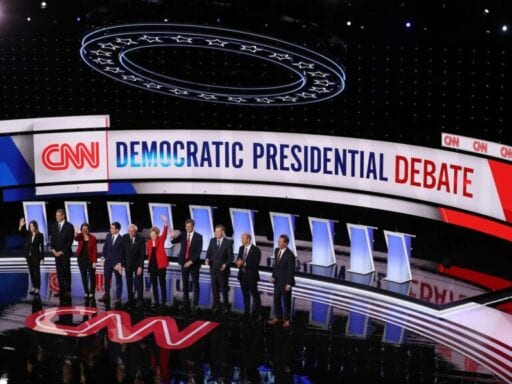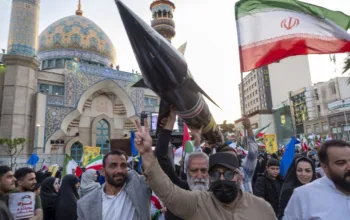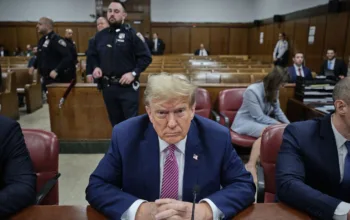So far, at least.
Democratic presidential candidates have mostly been able to avoid a substantive discussion of what immigration policy should look like. Expressing outrage over President Donald Trump’s policies has sufficed for debate soundbites.
That might be politically expedient; immigration is one of the top issues on voters’ minds, but also one of the most divisive. Being vague is a way to put off alienating various wings of the party until the primaries are over.
The candidates have tended to speak in platitudes, like when Amy Klobuchar said in the first debate, “Immigrants do not diminish America. They are America.” Beto O’Rourke and Cory Booker got mixed reviews for answering questions about immigration in Spanish in an attempt to show solidarity with Latino voters.
There was one moment that spurred numerous immigration think pieces. During the first debate in June, Julián Castro asked fellow candidates onstage to commit to repealing Section 1325 of the Immigration and Nationality Act, a provision in federal law that makes crossing the border without authorization a crime. But that moment stood out because it was unusually specific.
If a Democratic president makes “comprehensive immigration reform” a priority, as virtually all of the candidates have vowed, voters do not have much information about what that means. With a (mercifully) smaller pool of 10 candidates taking the stage for Thursday night’s upcoming debate, there might finally be more room to elaborate.
Here are five questions that moderators should ask to get a more expansive view of the candidates’ positions:
1. What immigration-related executive actions could we expect from your administration in your first 100 days?
The US Supreme Court has historically recognized the president’s broad powers over immigration, but Democrats have accused Trump of overstepping his executive authority with his unilateral, sweeping changes to immigration policy.
In the wake of Trump’s travel ban, when the president issued an executive order banning individuals from seven countries, Democrats in the House and Senate proposed a bill that would rein in the executive authority of all future presidents such that they could not issue any similar ban. House Democrats also filed a lawsuit challenging Trump’s declaration of a national emergency on the southern border, claiming that he could not invoke his emergency powers simply to circumvent Congress’ refusal to fully fund his border wall in its 2019 budget deal.
But limiting executive authority over immigration is a double-edged sword for Democrats. If Republicans retain control of the Senate as expected in 2020 and gridlock in Congress continues, a Democratic president’s only means of reversing the Trump administration’s immigration policies would be by executive fiat.
For that reason, candidates including Bernie Sanders, Kamala Harris, and Cory Booker rely heavily on executive actions in their immigration plans. For example, Booker would order the Department of Homeland Security on day one in office to bring detention centers into compliance with federal detention standards, and Sanders has said that his first executive action would be closing privately operated immigration detention centers.
Others have suggested executive actions they will pursue, but haven’t nailed down a timeline: Elizabeth Warren says she will first “work with Congress to pass broad-reaching reform” but is “prepared to move forward with executive action if Congress refuses to act.”
Joe Biden and Pete Buttigieg, meanwhile, have not made formal commitments to use executive authority to reverse Trump’s immigration policies.
While all of the candidates have promised wide-reaching, progressive change in immigration and across other issues, presidents only have so much time and political capital. After pushing through sweeping health care reforms with the Affordable Care Act, former President Barack Obama failed to pass a comprehensive immigration reform package in 2013.
So, asking the Democratic candidates to elaborate on their immigration priorities for their first 100 days will help determine whether the issue is actually a top priority for them.
2. What would your overall approach be to immigration enforcement on the US-Mexico border?
Republicans have accused Democrats of pushing for open borders. In reality, few go that far; some just think that crossing the border without authorization should not be a crime, as it is currently under Section 1325 of the Immigration and Nationality Act. Historically, most immigrants who cross the border illegally have never been prosecuted, but the Trump administration has begun doing so under its “zero tolerance” policy and cited those prosecutions as the basis of family separations.
Polls show that a majority of Americans oppose Trump’s border wall, but not all forms of border security: About three-quarters of the public support hiring “significantly more” border patrol agents and a third say that immigration levels should be decreased overall.
If voters’ attitudes toward border security are nuanced, Democrats’ border security plans should reflect that. To start, they will have to answer questions about how they will detain immigrants (if at all), what kinds of unauthorized immigrants might be targeted with limited enforcement resources, how much funding immigration enforcement agencies will get, and how they will reduce the backlog of cases in immigration court.
Democrats can agree that Trump’s method, which includes separating families in immigration detention and sending Central American migrants back to Mexico, is abhorrent. But how they would go about securing the border is a tricky question, and previous Democratic administrations have not exactly provided a good model.
Obama struggled to balance humanitarian concerns with border enforcement. As Trump has repeatedly noted, it is true that Obama did separate families in immigration detention, albeit on a much smaller scale than the current administration. Immigrant rights groups labeled him as the “deporter in chief” because he deported more immigrants than any other president — over 385,000 in fiscal years 2009 to 2011 and peaking at 409,849 in fiscal 2012 (though former Obama officials have defended that the administration only targeted recent arrivals and violent criminals).
Five years later, Democrats are still wrestling with how they will approach immigration enforcement, tackling it piecemeal for now.
The idea of abolishing US Immigration and Customs Enforcement has gained the most attention in advocacy circles. Elizabeth Warren has endorsed the “Abolish ICE” movement, and Kamala Harris has also pushed for major changes to the agency, suggesting that the federal government should “probably think about starting from scratch.” Castro has backed the decriminalization of unauthorized border crossings, challenging his opponents to do the same during a Democratic debate in June.
3. How many refugees should the US aim to resettle?
This is a simple, numerically based question that can help voters gauge the candidates’ commitment to reestablishing the US’s reputation as a world leader in protecting the most vulnerable immigrant populations. So much of the conversation around refugees and asylees in the debates so far has been dominated by denouncing Trump’s policies, so it would be useful to force the candidates to commit to hard numbers of how many they would admit.
Historically, the US has taken in more refugees, about 3 million since 1980, than any other nation. But the US has scaled back its refugee program under Trump, lowering the cap on refugees admitted to the US from 110,000 in fiscal year 2017 to 30,000 in fiscal year 2019 — the lowest number since the Refugee Act was signed into law in 1980. And the Trump administration is expected to cut refugee admissions even further.
Some Democratic presidential candidates have proposed elevating the refugee cap as part of their immigration plans. Booker and Castro have proposed reverting to the pre-Trump refugee cap of 110,000, but Elizabeth Warren would go even further, setting the cap at 125,000 initially and increasing it to 175,000 by the end of her first term.
4. How would you work with governments in Central America to reduce factors driving migrants away from their home countries?
In light of declining migrant arrests, Trump may claim that he is delivering on his promise to secure the southern border, but it’s not so clear that his policies have done anything to address the underlying problem: unprecedented numbers of migrants fleeing Central America. This question would illuminate how Democrats would reduce push factors and think not just about a border crisis but a regional crisis.
Previously, migrants arrested at the southern border were primarily single adult males from Mexico. But since the summer of 2018, there has been a fundamental change in migration patterns: Now, it is primarily Central American children and families.
Castro and Booker have proposed significant aid packages, but Democrats would also likely need to smooth over political tensions with Mexico and the “Northern Triangle” countries of Guatemala, Honduras, and El Salvador in Trump’s wake.
In June, Trump had threatened to impose tariffs on all Mexican goods if it did not step up its immigration enforcement efforts.
And acting US Customs and Border Protection Commissioner Mark Morgan told reporters Monday that Trump is pressuring Northern Triangle countries to adopt agreements that would effectively cut off migrants before they reach the US. The so-called Safe Third Country agreements would make any migrant who passes through those countries ineligible to apply for asylum in the US.
Author: Nicole Narea
Read More



